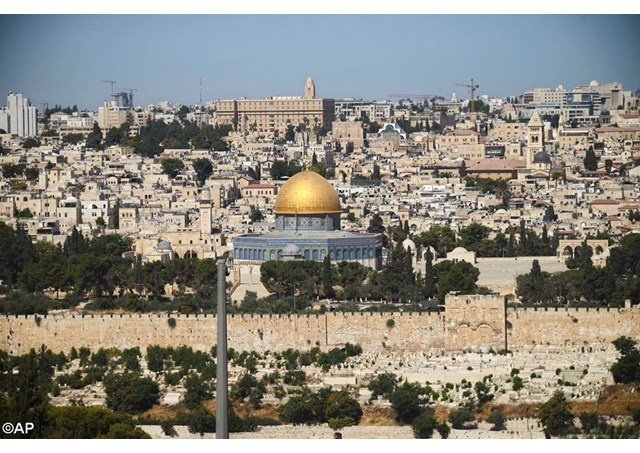
Rabbi Rosen on role of Jerusalem in interfaith relations

(Vatican Radio) An interfaith forum took place in Jerusalem on Wednesday exploring the importance of that holy city for Jews, Christians and Muslims.
Entitled ‘Jerusalem and the monotheistic religions; symbols, attitudes, real life”, the forum was organised by the Pontifical Notre Dame Center there, together with the European University of Rome.
Among the keynote speakers at the event was Rabbi David Rosen, honourary president of the International Council of Christians and Jews, and a well-known voice for improving interreligious relations.
He spoke to Philippa Hitchen about the timely nature of this interfaith encounter….
Rabbi Rosen believes that the key mesesage of the conference is that "Jerusalem can never be anybody’s exclusive embrace, and we will only truly succeed in seeking the peace of Jerusalem, to use the phrase of the psalmist, when we can recognize, and respect, and even embrace the attachments of others to the city”.
In the context of the power struggle between Palestinian and Israeli nationalism, Rosen says, the city “becomes not just a place of conflict, but a tool of conflict, in which the sides exploit its spiritual potency for their own advantage”. This is, he adds, “a zero sum mentality” which will only be overcome “when we can move beyond that and recognize the attachment of the other as a blessing and not something to feel cursed by”.
Role of religious leaders
Speaking of the role of religious leaders in seeking to end the conflict in the Holy Land, Rabbi Rosen notes that one of the “blessings” that came out of the visit of Pope John Paul II to Israel in the year 2000 was the establishment of the Council of Religious Institutions of the Holy Land, (www.crihl.org).
This council has three main purposes, he says: firstly to “keep open avenues of communication between religious leaders”, the second, “to condemn incitement” and attacks on any religious sites, and thirdly “to provide religious support for political initiatives to bring an end to the conflict, so that two nations and three religions could flourish in the land”.
Voicing spiritual identities
With regard to the first two goals, Rabbi Rosen believes there has been “some moderate achievements”. The third goal, he says, would appear to be “a complete failure, but not because the religious leaders don't want to be brought in - on the contrary, they want to be brought in but the political leaders are not interested in doing so”.
Religious leaders in the region, he notes, are appointed by the political authorities so it’s “delusional” to think that they’re going to challenge their leaders or bring about any breakthrough in the political reality.
Importance of religions in peacebuilding
But he recalls the words of the Lutheran bishop of Jerusalem recently to U.S. President Trump’s envoy to the Middle East, Jason Greenblatt: “We won’t be able to bring about peace, but peace will not succeed and hold together without us”. The role of religious leaders, he adds, can be “a very significant one in contributing to a successful peace process, providing the voices of the spiritual identities that connect people to this land”.
Part of the failure of peace initiatives in the past, Rabbi Rosen believes, has been a “failure to take the religious dimension seriously”. In light of the recent renewed tensions on the Temple Mount, he concludes, this conference is timely because it highlights “how combustible Jerusalem is, how it is exploited as a political football […] and how it is delusional to think we can resolve this conflict without the religious dimension.
| All the contents on this site are copyrighted ©. |


